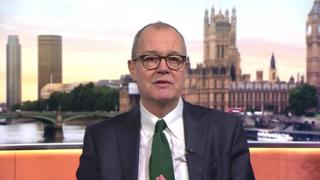
Sir Patrick Vallance says he “argued stronger than anyone for action for lockdown”
The government’s chief scientific adviser Sir Patrick Vallance has said he was rebuked for arguing strongly in favour of imposing Covid lockdown restrictions earlier this year, it has emerged.
In an email uncovered by a BBC Freedom of Information request, Sir Patrick reveals he was given a “telling off” from other senior officials.
Some scientists argue lives could have been saved had a lockdown been introduced earlier. The government insists there was “no delay”.
In a statement, the Department of Health and Social Care said government policy had been “guided by the advice of world-renowned scientists”.
The UK has one of the highest number of coronavirus deaths per capita in the world, though officials insist it’s too early to draw accurate comparisons with other countries. The Department for Health and Social Care insists there was no delay in locking down.
The email obtained by the BBC appears to be a discussion of a Sunday Times article in May criticising the delays in announcing a lockdown in March.
It’s not known when the “telling off” occurred, but speaking to Parliament’s science and technology committee in July, Sir Patrick referred to advice given by the Scientific Advisory Group for Emergencies (Sage) on 16 March for “additional social-distancing measures” to be implemented “as soon as possible”.
A full lockdown was not introduced until 23 March. It’s now thought the number of cases rose dramatically in the period just before that.
In the email, Sir Patrick writes that he “argued stronger than anyone for action for lockdown” but received a “telling off” from chief medical officer Professor Chris Whitty and the then Cabinet Secretary Sir Mark Sedwill.
Sir Patrick and Prof Whitty regularly appeared at news conferences together updating the public on measures taken to combat coronavirus, without noticeably disagreeing.
On 16 March, the government issued advice “against all unnecessary social contact with others and unnecessary travel” including warnings to avoid pubs, bars and restaurants. However, premises were not ordered to close until 20 March, whilst on 23 March a full lockdown was introduced whereby people could only leave the home for exercise or grocery shopping.

















